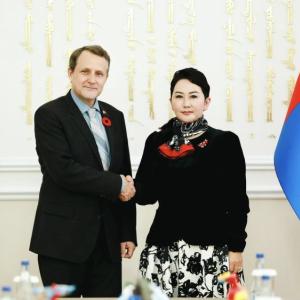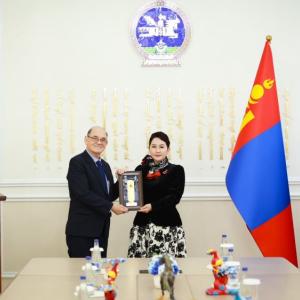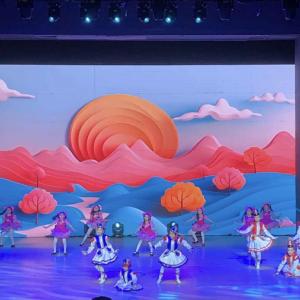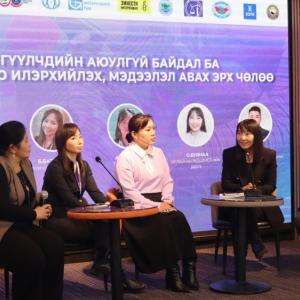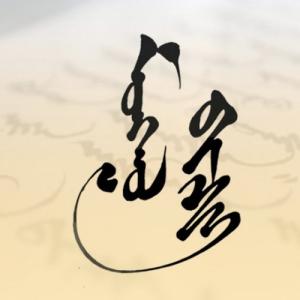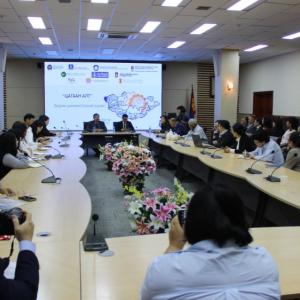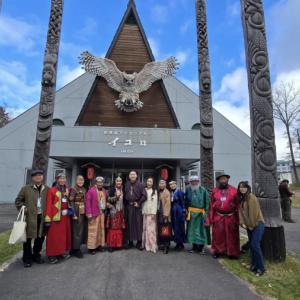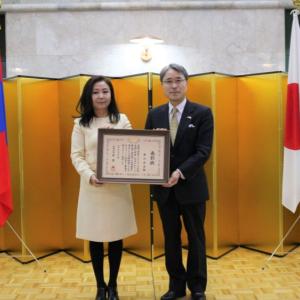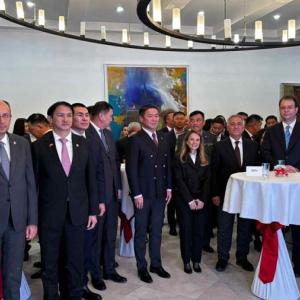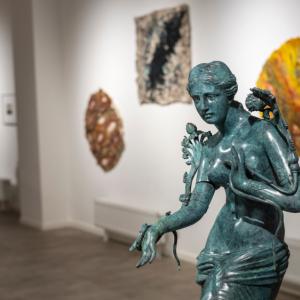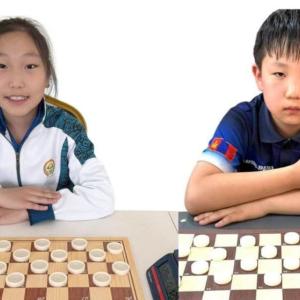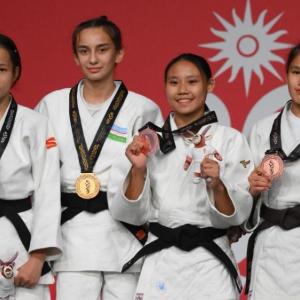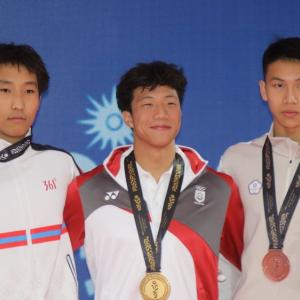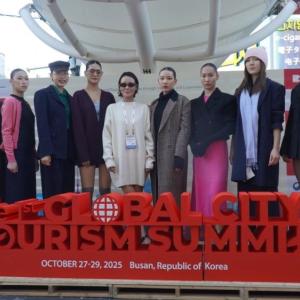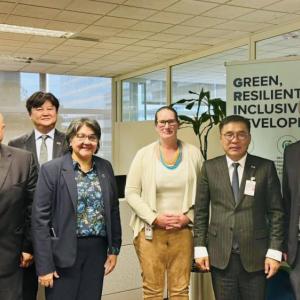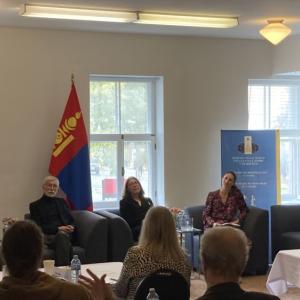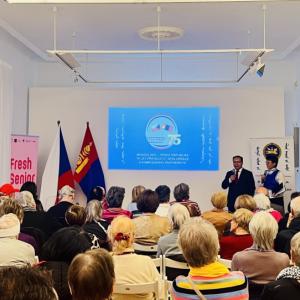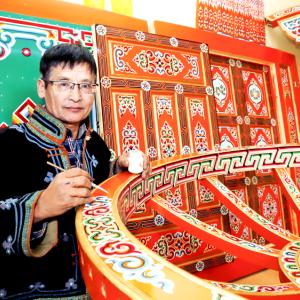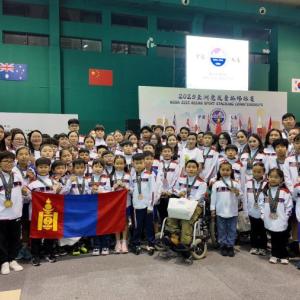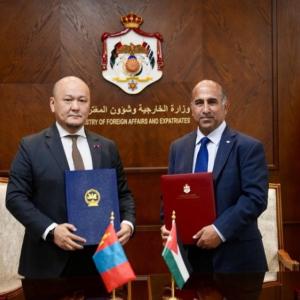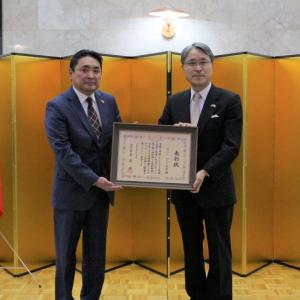Emerging young filmmaker recognized
The Mongol Messenger
Director Uisenma Borchu is a young and free-spirited woman who has got dozens of ideas waiting to be interpreted and shared to people. She is a modest thinker. “I was always curious about everything and watched those who are in a weird situation. I had never imagined that I would be a director even though I loved watching movies. But I felt the need to express my thoughts and opinions. So I used to write them on a paper trying to compose a poem or story. That was me seeking ways to express what’s on my mind. And when I was 22, I realized that film could convey my messages perfectly. I had a big opportunity to study at the University of Television and Film Munich”, she says about how she became director.
Having lived in Germany for the last 25 years, Uisenma wishes to go to Mongolia every summer. Visiting Mongolia is the main event of year for her family. As her mother studied and decided to work in Germany, Borchu’s family moved to the country. Given that her father Borchu is a painter and her sister is designer, Uisenma’s got it in her blood. Borchu painted the poster of her debut film ‘Don’t look at me that way’ and is a good advisor about art. Her name is a Tibetan word with meaning ‘love my parents’ and she is happy is with her name because her parents are her gods.
Uisenma won the FIPRESCI Prize for Best Film at the Munich International Film Festival on July 4 last year with her debut feature ‘Don’t look at me that way’. The FIPRESCI jury said, “It’s very creative, very innovative and also brave and daring. Although it does contain nudity and sex scenes, it is not provocative or sensational, but reflects the free-spirited Hedi, who is on the one hand very selfish and wants to own anything and everybody, but on the other hand breaks almost all of society’s taboos, but not in the way of shocking. "Don't Look at Me That Way" belongs to the very interesting trend in Munich Film Festival's New German Films category this year, that has a mix of cultures, and thus a rich and different aroma of filmmaking. It is basically because of the DNA of the directors who were not born in Germany, and settled down in the country later”. ‘Don’t look at me that way’ is a film about young woman Hedi who initially falls in love with her neighbor Iva and shows more interested in Iva’s father later.
She also received an award of ‘Unique idea’ at the REC film festival held in Spanish city Tarragona. “The essence of women has been exposed very nicely and frankly, I have never watched a movie that shows it from this angle” the jury stressed. Solidifying her success, Uisenma then won Best Newcomer Director Award at the Bavarian Film Award 2015 2015 in Munich, Germany on January 15, 2016.
“By ‘Don’t look at me that way’, I wanted to reveal the behavior and inner world of women and true essence of life. I mean, the gender equality talks seem frivolous and like slogans which echo through the cliff. I want to give a blow to the “What a shame for a woman?” kind of tendencies and opinions shown by obsolete minded people” Uisenma talks about her multiple award winning film. Not only did she direct the movie, she also portrayed the role of Hedi, main character exposing her talent. She has discovered herself in many ways during the making of ‘Don’t look at me that way’ and learned a lot, according to Uisenma. Adding to lack of time to cast, she knew exactly what she wanted from Hedi. As dialogues were not written specifically for each scene in the script, there was a time when Hedi made up her lines at the moment of shooting. Both Uisenma and Catrina Stemmer, main characters were not professional actors and some scenes were only shot once.
Apart from ‘Don’t look at me that way’, Uisenma has directed three documentaries.
1.DONNE MOI PLUS is a film about two women getting to know each other, naked in one apartment. The main characters are naked because she wanted to get beyond the clothing. For Uisenma, being naked and seeing someone naked is pureness. That was the motivation to make the documentary.
2.HIMMEL VOLLER GEIGEN is a film about a 89 year-old woman who teaches violin. The old lady and Uisenma have conversations about life, love and death in the documentary.
3.KHUYAGAA is a film about a nomad boy. Uisenma made this documentary for German children’s television KIKA. It is a series about how other children live all over the world.
“I can only reproduce what society is offering me. All in all I was very surprised that people had so much affection about the film, that they felt the film. That is what I make films for. I don’t want people to say: Hey, that’s a nice film, but I want them to feel it, deep and pure. And to feel pain or helplessness is a good energy. It is not about entertainment”, the director says.
As an artist, Uisenma wants to fight various forms of discriminations based on ethnicity, race and gender through her films. Filmmaking is not her job, but passion. She is a young rebellious woman who is not afraid to show what society refuses to accept. As long as she has her wings – gut and inspiration, Uisenma Borchu has a long way to go.
Having lived in Germany for the last 25 years, Uisenma wishes to go to Mongolia every summer. Visiting Mongolia is the main event of year for her family. As her mother studied and decided to work in Germany, Borchu’s family moved to the country. Given that her father Borchu is a painter and her sister is designer, Uisenma’s got it in her blood. Borchu painted the poster of her debut film ‘Don’t look at me that way’ and is a good advisor about art. Her name is a Tibetan word with meaning ‘love my parents’ and she is happy is with her name because her parents are her gods.
Uisenma won the FIPRESCI Prize for Best Film at the Munich International Film Festival on July 4 last year with her debut feature ‘Don’t look at me that way’. The FIPRESCI jury said, “It’s very creative, very innovative and also brave and daring. Although it does contain nudity and sex scenes, it is not provocative or sensational, but reflects the free-spirited Hedi, who is on the one hand very selfish and wants to own anything and everybody, but on the other hand breaks almost all of society’s taboos, but not in the way of shocking. "Don't Look at Me That Way" belongs to the very interesting trend in Munich Film Festival's New German Films category this year, that has a mix of cultures, and thus a rich and different aroma of filmmaking. It is basically because of the DNA of the directors who were not born in Germany, and settled down in the country later”. ‘Don’t look at me that way’ is a film about young woman Hedi who initially falls in love with her neighbor Iva and shows more interested in Iva’s father later.
She also received an award of ‘Unique idea’ at the REC film festival held in Spanish city Tarragona. “The essence of women has been exposed very nicely and frankly, I have never watched a movie that shows it from this angle” the jury stressed. Solidifying her success, Uisenma then won Best Newcomer Director Award at the Bavarian Film Award 2015 2015 in Munich, Germany on January 15, 2016.
“By ‘Don’t look at me that way’, I wanted to reveal the behavior and inner world of women and true essence of life. I mean, the gender equality talks seem frivolous and like slogans which echo through the cliff. I want to give a blow to the “What a shame for a woman?” kind of tendencies and opinions shown by obsolete minded people” Uisenma talks about her multiple award winning film. Not only did she direct the movie, she also portrayed the role of Hedi, main character exposing her talent. She has discovered herself in many ways during the making of ‘Don’t look at me that way’ and learned a lot, according to Uisenma. Adding to lack of time to cast, she knew exactly what she wanted from Hedi. As dialogues were not written specifically for each scene in the script, there was a time when Hedi made up her lines at the moment of shooting. Both Uisenma and Catrina Stemmer, main characters were not professional actors and some scenes were only shot once.
Apart from ‘Don’t look at me that way’, Uisenma has directed three documentaries.
1.DONNE MOI PLUS is a film about two women getting to know each other, naked in one apartment. The main characters are naked because she wanted to get beyond the clothing. For Uisenma, being naked and seeing someone naked is pureness. That was the motivation to make the documentary.
2.HIMMEL VOLLER GEIGEN is a film about a 89 year-old woman who teaches violin. The old lady and Uisenma have conversations about life, love and death in the documentary.
3.KHUYAGAA is a film about a nomad boy. Uisenma made this documentary for German children’s television KIKA. It is a series about how other children live all over the world.
“I can only reproduce what society is offering me. All in all I was very surprised that people had so much affection about the film, that they felt the film. That is what I make films for. I don’t want people to say: Hey, that’s a nice film, but I want them to feel it, deep and pure. And to feel pain or helplessness is a good energy. It is not about entertainment”, the director says.
As an artist, Uisenma wants to fight various forms of discriminations based on ethnicity, race and gender through her films. Filmmaking is not her job, but passion. She is a young rebellious woman who is not afraid to show what society refuses to accept. As long as she has her wings – gut and inspiration, Uisenma Borchu has a long way to go.
Kh.Aminaa
Photo source: 2015 Sven Zellner / Agentur Focus
Photo source: 2015 Sven Zellner / Agentur Focus
The full article can be found from Mongolia Today magazine's issue No.1 /36/ for January-March 2016.
 Ulaanbaatar
Ulaanbaatar





